Creating prosperity in Myanmar with tea
Nestled in the heart of Myanmar lies a tiny new tea operation with a big ambition: to change the livelihoods of locals through the power of tea.
Five Trees Estate sits at the edge of Kyayk Saung village in Mogok*, an 800-year-old region that lies 200km north of Mandalay, the second-largest city in Myanmar, and 300km south west of China. The entrance to the estate is flanked by five majestic, 800-year-old banyan trees that play a special role in protecting the garden. The estate is owned by pioneering specialty tea company Mogok Tea, the brainchild of London-based, Mogok-native, Phyu Thwe.
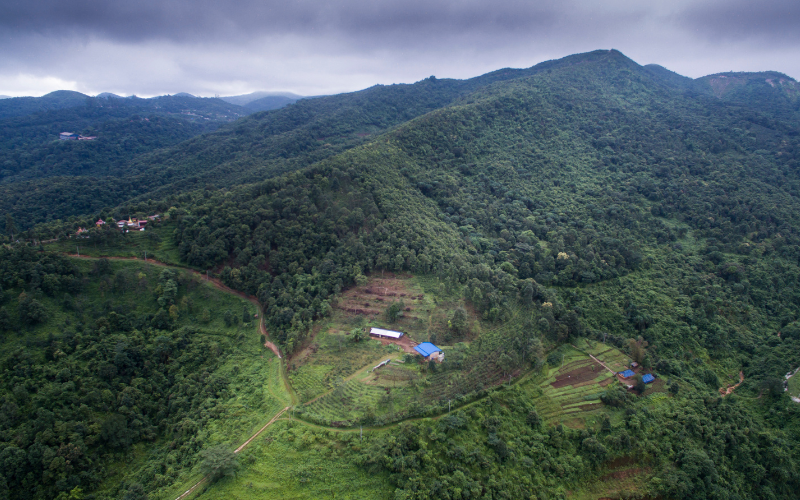
Phyu created Mogok Tea as a social enterprise with the purpose of lifting the standard of Myanmar-grown tea, exporting it to discerning tea drinkers across the world and improving the prosperity of local villagers as a result. Five Trees Estate is Mogok Tea’s first tea garden.
The enterprise is a joint effort between Phyu^, her devoted tea masters, Ko Pe’Tee and Naing Too, and tea consultant Beverly Wainwright from the Scottish Tea Factory, who meticulously trained and mentored Ko and Naing.
Their dedication to quality tea production was recognised when their Black Ruby tea won Gold and their Tiny Temple Green tea earned a highly commended at the Leafie Awards in London in 2022. Phyu was honoured with the Tea for Life award in recognition of her unwavering commitment and effort in establishing this socially conscious enterprise.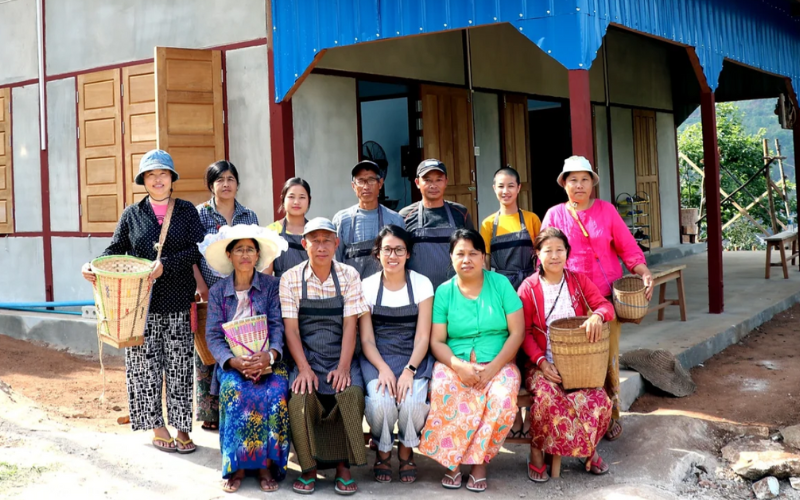
Phyu (bottom centre), Ko and Naing (behind her) and her team
The history of tea in Myanmar
Myanmar is cushioned between the world’s top two tea producing countries: India and China. The tea plant, Camellia Sinensis, grows wild and is also cultivated on a small scale across the country. Crafting tea has been part of Myanmar culture since the 11th century. In Myanmar language, tea is called ‘laphet’, adopting a different naming convention to all other Eastern and Western tea drinking countries.
Despite tea’s tenure in Myanmar culture, processing techniques are basic and unstandardised, generally creating inconsistent, lower-quality finished tea. Many villagers make tea for their own consumption, particularly in the state of Shan, where Mogok is located. Any small-scale commercial production is sent to the local market only, where tea is seen as a low value commodity and is often given away for free in restaurants.
The hills in Mogok are abundant with Camellia Sinensis. The region lies only a few hundred kilometres south of the border of the famous Chinese tea producing region of Yunnan, and therefore shares a similar environment that influences the tea plants there.
But tea isn’t only what Mogok is known for.
A region brimming with red and green treasure
The land underneath Mogok was once filled with an abundance of rubies and gemstones. The region has relied on mining these stones for over 800 centuries. Unfortunately, this sustained, extensive mining has devastated the local environment, and the once plentiful gemstone reserves can no longer support the local economy. Many members of the community now depend on waste rocks from the large mining companies to sustain their livelihoods. To supplement their income, it is widespread practice for villagers to gather these rocks and beat them with a hammer in the hope of finding missed gemstones. Due to the futility of this way of living, many of the younger generation have left the villages, leading to a significant migration of the workforce beyond the region’s boundaries.
Phyu is looking to change this.
A new generation of pioneer
Phyu was born in 1984 in Kyayk Saung village, Mogok. She considers herself to be fortunate. She was able to study in Myanmar’s largest cities, Mandalay and Rangoon as a teenager, and in 2004, she moved to London where she trained as an accountant.
Living in London, Phyu worked hard and enjoyed the city's social scene. But her life was in compete contrast to those back home in Mogok. On a day when Phyu had an appointment to have her nails and eyelashes done, she had a profound realisation that her beauty bill that day could pay for living costs for her village for an entire month.
It was that moment that led Phyu to create Mogok Tea. She felt, deep in her heart, that she needed to create something in her life that would outlive her. Phyu wanted to find a solution that would generate sustainable incomes for her people in Mogok over their lifetimes.
Creating prosperity with tea
Phyu’s family owns tea gardens in Mogok. Living in London, Phyu knew how embedded tea was in the English culture. So, an idea grew. Could Phyu create a high-quality, export-focused tea operation in Mogok that would teach locals new skills, and create a viable future for them?
Phyu engaged speciality tea expert Beverly Wainwright. Rather than putting a deposit down on a house in London, Phyu plied all of her life savings in to establishing Mogok Tea. She built a micro tea factory on site, had local villagers trained by Beverly in tea plucking and processing, and created strict standards for processing and health and safety.
Her team completed their first harvest in December 2019 and Phyu sold her first batch of tea to Rakkasan Tea Company in Texas, USA, in February 2020.
An estate guarded by a sacred protector
The ancient banyan trees are not only the inspiration for the name of the garden, they also have an important role in protecting it.
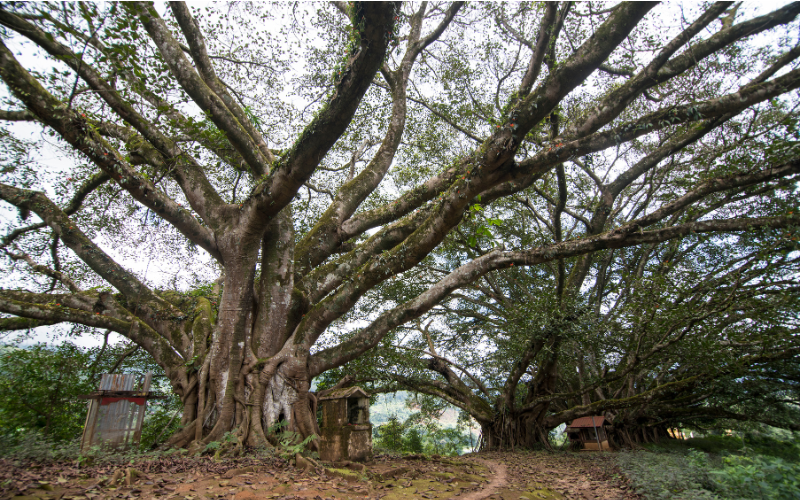
Intertwined with the trees’ history is a benevolent guardian spirit, the 'Yoke Ka Zoe', who has protected the local land and generated prosperity for as long as the trees have stood.
Phyu and her team have chosen the names of each tea to pay homage to the guardian spirit and to reflect their deep connection to the land.
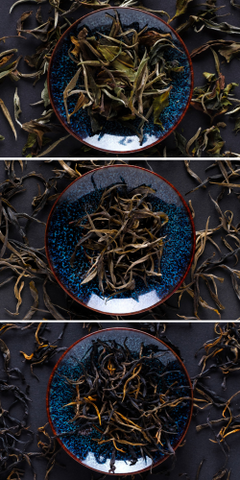
Tree Spirit White mirrors the purity and
understated grace of the guardian, symbolising the symbiotic bond between nature and their dedicated tea pickers.
Tiny Temple Green pays tribute to the hallowed spots beneath each banyan tree where wishes are whispered and hopes are harboured, a testament to the spirit's ability to bring aspirations to life.
Black Ruby is a nod to the prosperity that the guardian spirit symbolises, with leaves as precious as the gems the miners seek; a dark brew rich with the promise of protection and abundance.
The team produces these white, green and black tea and intends to perfect these before moving on to other types of finished tea.
The challenge of changing a culture and an industry
Mogok Tea is a fledgling business. Five Trees Estate only produces 350kgs of each tea a year. And when the quality of the finished leaf doesn’t meet Phyu’s exacting standards, it isn’t exported.
The villagers’ work ethic is different to Western standards. They maintain the belief that, one day, they’ll find a huge ruby in the mining offcuts that will bring them prosperity. This can pull them away from the tea operation and their future there. And there is a tendency to slip back into old habits when it comes to tea processing. Phyu spends a lot of time supporting them in developing their professionalism and commitment to employment at the tea garden.
In a highly charitable act, Phyu pays her team all year round, even when they’re not harvesting or processing tea. It’s important to her that her team can rely on the income, and remain committed, while she builds a viable business.
Her quest is to create an industry capable of teaching new skills to locals and fostering sustainable economic growth in the region.
Running the business is exceptionally hard for Phyu. She works full time in London managing her own accountancy practice. As all business owners do, she’s come up against numerous obstacles. But she has an unwavering belief in what she is doing, and the firm knowledge that she wants to use her good fortune to benefit those in a much less privileged position.
Phyu herself is a rare gem.
~ Anna
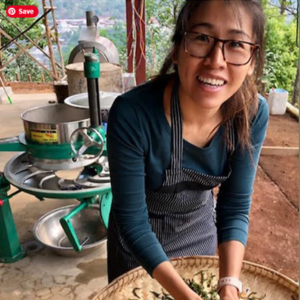
From Phyu: “Tea has changed my life in many ways. It has enabled me to contribute positively to my village and gives me purpose in life. The world of tea has introduced me to a lot of remarkable individuals, all united by shared values and aspirations. This journey has been enriching and fulfilling for me. I am particularly thankful for the opportunity to have met Anna, a woman of immense strength and inspiration. Sharing our journey and our tea with her has been a true privilege. It is my sincere hope that every sip of tea you take resonates with the spirit and togetherness we share through our tea.”
Harvesting and processing tea at the Five Trees Estate: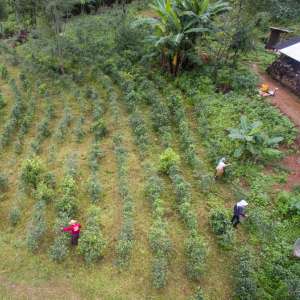
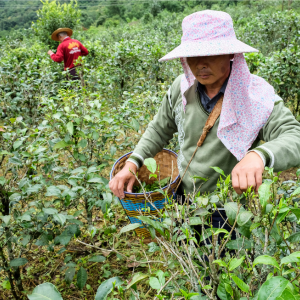
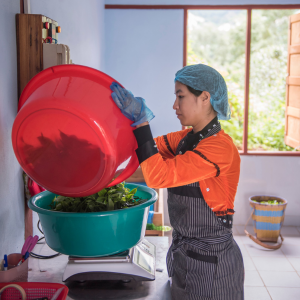
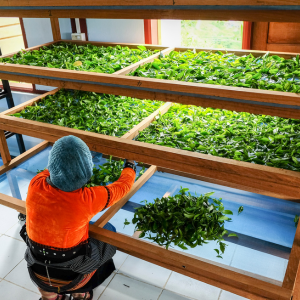

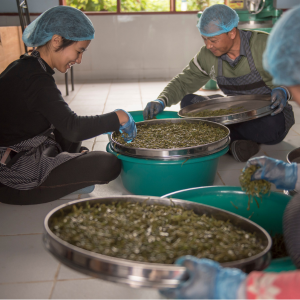
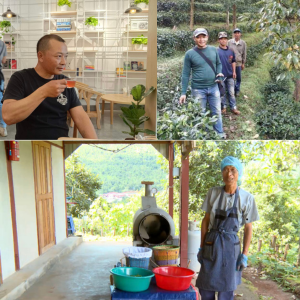
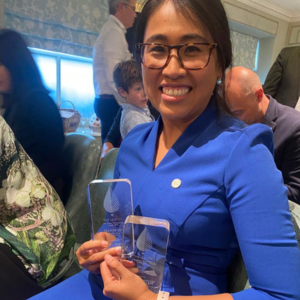
Shop our Mogok tea collection and experience the flavour and the story of these beautiful, rare teas.
Notes:
* pronounced ‘mow-gok’
^ pronounced ‘pew'


